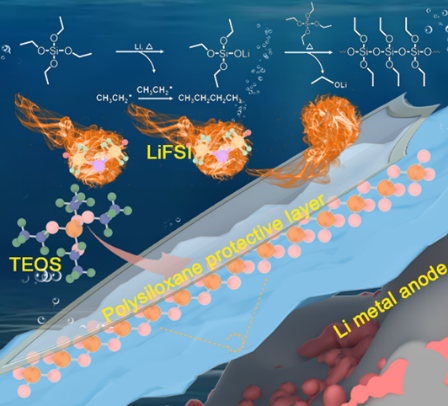《Constructing Thermo-responsive Polysiloxane Shields via Lithium Initiation to Inhibit Thermal Runaway of Lithium Metal Batteries》
Lithium metal batteries (LMBs) have unparalleled high-energy-density, yet the threat of safety issues is significantly severe due to the potential high energy release of violent reactions between lithium metal and electrolyte under abusing conditions. Effective methods to mitigate the parasitic reactions are lacking. Here, we propose a synergistically driven construction of a stable passivation layer by lithium and thermal to inhibit the reactions to ensure the safe of LMBs. It is shown that at elevated temperature, lithium induces tetraethyl orthosilicate (TEOS) to undergo polycondensation and form thermally stable polymer networks, resulting in passivation of lithium metal anode. At the same time, (1,3,5,2,4,6-triazatriphosphorine) PFPN functions as nonflammable component to empower the electrolyte with flame retardancy and cycling stability (TEOS/PFPN). As a result, the formulated electrolyte enhances the safety of Li/NCM pouch cells against fire and explosion during nail penetration. Meanwhile, the TEOS/PFPN raises the thermal runaway (TR) trigger temperature from 160.4 to 252.7℃. Furthermore, the maximum temperatures during TR are reduced from 1188.7 to 723.0°C. Finally, the TEOS/PFPN demonstrates excellent compatibility with lithium metal anodes and Ni-rich layered cathode. This study presents a promising way to develop high-safety electrolytes for LMBs and offers valuable insights into strategies for mitigating TR.

